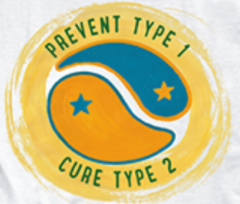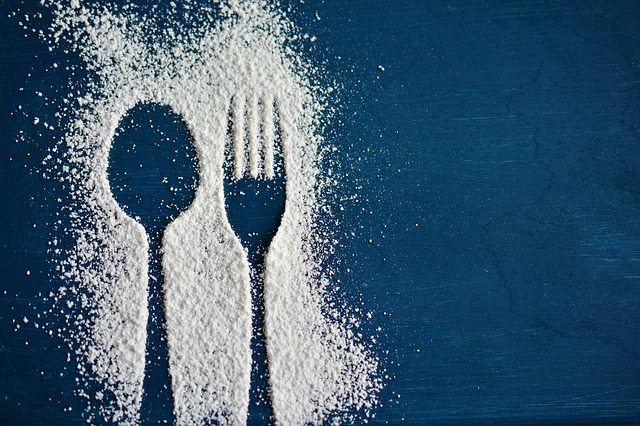Ever since Robert Atkins launched his famous Atkins Diet in 1972, consumers have been encouraged to blame their weight problems on the carbohydrates (sugars and starches) in their food. Dr. Atkins claimed that the best way to lose weight and improve your health is to eat a diet that is extremely low in sugars and starches. However, research does not support Atkins’s ideas. (Atkins himself even continued to have weight problems, as you can see for yourself by looking at photographs of him.) In fact, many of the “experts” who push low-carb diets are overweight.
Scientific research has shown that sugar is not particularly fattening. Sugar helps to satisfy your appetite, but fat does not. Also, the human body strongly resists turning sugar into fat. This is true regardless of whether the sugar is in the form of glucose (which comes from starch) or in the form of table sugar (sucrose, which provides a 50:50 mixture of glucose and fructose).
A typical meal provides a mixture of carbohydrates (starches and sugars), fat, and protein. During digestion, starch is quickly and easily broken down into a simple sugar called glucose, which is your body’s favorite fuel. Sucrose (table sugar) is broken down to a 50:50 mixture of glucose and another simple sugar, called fructose. As the glucose from your meal enters your bloodstream, the rise in blood glucose levels causes your pancreas to release a hormone called insulin. Insulin tells your liver and muscles to store much of the incoming glucose in the form of a starch called glycogen. Insulin also allows your heart and muscles to use glucose for energy. As a result, insulin keeps your blood sugar from rising to a dangerously high level, even after you eat a big sugary or starchy meal.
Besides telling your body to store or use glucose, insulin tells your fat cells to store fat. Insulin also tells your body to use the amino acids from the protein in your food to make your body’s own proteins. Because of this effect of insulin, our bodies tend to store the fat from our food right away. That is why the fat in our fat cells has practically the same mixture of fatty acids as the fat from our food.
The human body can convert sugar into fat, but it rarely converts much sugar to fat. The reason is simple: the conversion process is a waste of energy. About 30% of the calories are lost in the conversion process. For this reason, your body would rather burn sugar as sugar (and get 100 calories of energy from 100 calories of sugar) than convert sugar to fat and get only 70 calories of fat from 100 calories of sugar.
This process of turning sugar into fat is called de novo lipogenesis. To study de novo lipogenesis, some researchers asked 8 lean women and 5 obese women to eat three different test diets while staying in a test chamber called an indirect whole-body calorimeter. One of the test diets was a control diet that gave each woman enough calories to match her daily energy expenditure. The other test diets gave each woman 50% more calories than she was expending. These extra calories came from a mixture of sugar and fat. In one of the overfeeding diets, the extra sugar came from glucose; in the other, the extra sugar came from sucrose (which provides a 50:50 mixture of glucose and fructose). The women were also given doses of “heavy water” (water in which some of the hydrogen atoms have two protons instead of one). The heavy water enabled the researchers to estimate how much of the fat in a woman’s bloodstream was newly made out of sugar, as opposed to coming from the fat she just ate or from her body’s stores of fat.
When the women were taking in 50% more calories than they needed, they did convert more of their dietary sugar to fat. However, the absolute amount of fat that was made out of sugar was small and did not make a significant contribution to weight gain. The women made the same amount of fat, regardless of whether the extra sugar was glucose or sucrose.
Other studies have shown that the human body prefers to burn sugar and store fat. As long as your carbohydrate intake is less than your total energy expenditure, you will turn practically no sugar into fat. If you eat extra calories from a diet that provides a mixture of fat and sugar, your weight gain will come from the storage of the fat from the food.
In contrast, it is hard to overeat if you are eating a low-fat, high-fiber, high-carb diet. For example, to get enough calories from a diet of nothing but potatoes, a man would have to eat about 20 potatoes a day. Potatoes contain lots of starch and adequate amounts of protein, but very little fat. If the man ate an extra potato or two, his body would store very little of the excess starch as fat. For this reason, you see remarkably few obese people in populations that eat a low-fat, high-fiber, high-carbohydrate diet. You also see remarkably few cases of type 2 diabetes. Scientists have known since the 1920s that high-carbohydrate diets make people more sensitive to the effects of insulin. Thus, they reverse the insulin resistance that is the underlying problem in type 2 diabetes.


